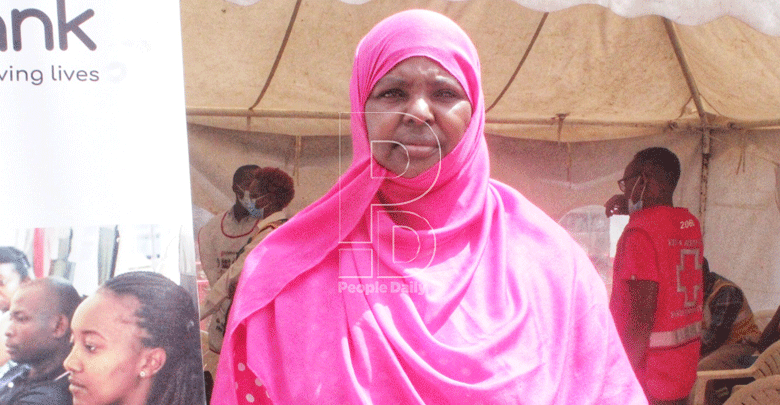Why I promote regular blood donation, ambassador

At just 17 years old, Aisha Dafalla donated blood for the first time in school after a talk from a blood transfusion group that had gone to educate the girls on the significance of donating blood.
She lost consciousness and when she opened her eyes, her parents were besides her.
“I think I fainted because it was my first time. My parents really scolded me, and I did not donate again,” recalls Aisha.
She never thought of blood donation again until in 1986 when her workmate’s brother was involved in an accident and needed blood. In this moment, she made the decision to always donate blood.
“She took me to the intensive care unit to see her brother. They did a test to check whether I was a suitable blood donor and I was able to donate. I have never stopped donating blood ever since,” she explains.
When she started donating, Aisha admits it was a secret affair, but in 1989, she had to let the secret out after she was given a certificate by the blood donor services on her eighth donation.
Parental blessing
“In the evening, I gave my father the certificate and he was shocked that I was still doing it.
Surprisingly, he gave me his blessing and told me to continue if it was what I wanted,” she recalls.
When she got married, Aisha managed to convince her husband (now deceased) to join her in donating blood.

“There was a time his aunt was very sick and I was in Mombasa by then. His cousins called me at midnight telling me their mother was very sick.
I called the regional manager for Kenya National Blood Transfusion Service (KNBTS) at the Coast and asked whether he can get blood to save the patient.
When he saw the assistance they got, my husband was inspired to start donating,” she adds.
Aisha has so far donated blood 68 times and she is glad that her son and some nieces are following in her footsteps.
“My son was at home during school holidays and I was due to donate. I had requested him to take me to a centre and when we got there, a lady was mobilising people to donate blood for her mother.
I told the clinical officer I wanted my blood to go to the lady’s mother and my son was moved by this act that he went to donate without informing me.
It was after he had donated five other times that I discovered that he has followed my passion. That moved my heart a lot,” she recalls.
According to KNBTS, seven people in the country require blood for every 10 minutes.
One pint of blood can save up to three or four people while three teaspoonful of blood can save a newborns life. One can donate if they are aged between 16 and 65, and must weigh at least 50kgs.
“I’ll be turning 58 years in December. I think donating has regenerated me since it’s said each time you donate you lower chances of getting stroke, high blood pressure, diabetes, cancer,” she says.
When a person donates, they are given a card that shows them when their next donation will be.
But for women, sometimes this day falls on their period, when they are breastfeeding or pregnant.
Aisha believes the lack of information makes people scared of donating blood.
“I feel that sheikhs and pastors should be called to talk about this and dispel myths around donating blood,” she notes.
Aisha’s passion has been to improve the donation system in the country and wants to achieve this by mobilising people to donate blood.
She, therefore, founded Blood Donor Champion Network this year to attain this objective.
Mission possible
“I usually see Machakos, Kajiado and Kiambu ambulances at the Kenyatta National Hospital coming to collect blood and it makes me wonder whether we have people in these counties who, if sensitised, can also donate blood. This can in turn minimise overreliance on Nairobi,” she explains.
She decided to seek counsel from the KNBTS director on how she can accomplish her vision.
Little did she know in this visit she would be crowned as the country’s new blood donation ambassador.
“I was in Malindi when I received the call to come to Nairobi and meet the director.
That’s when I was appointed as the ambassador. I was shocked and wept because I didn’t anticipate it,” she recalls.
She was bestowed the honour together with Sanya Alpha Kennedy, who has donated blood 95 times since he was in Form Three at Pumwani Boys’ High School in Nairobi
With her new role, Aisha is supposed to sensitise Kenyans, advocate for blood donation and improve the process in the country.
She will be working with the ministries of tourism and devolution together with corporates to sensitise the community to attain her goal of mobilising at least 100,000 Kenyans to be regular blood donors within a year.
“It’s sad that we only think about this during disasters; that’s the only time people come in large numbers.
When we have a regular donor, they can donate four times or three times a year, which means we can have 300,000 regular donors and since one pint saves three or more lives, that will be 900,000 lives saved. That will be a plus,” says Aisha.
In 2019, Aisha had the opportunity to tour Rwanda on World Blood Donor Day, held yearly on June 14, and was surprised to see that blood on shelves waiting for patients unlike here in Kenya where patients are in wards waiting for blood.
“We need a lot of awareness as there people who don’t know how and where to donate and even the benefits of donation.
We need to start with the community and I want to begin at the constituency level and then countrywide,” she says in conclusion.






